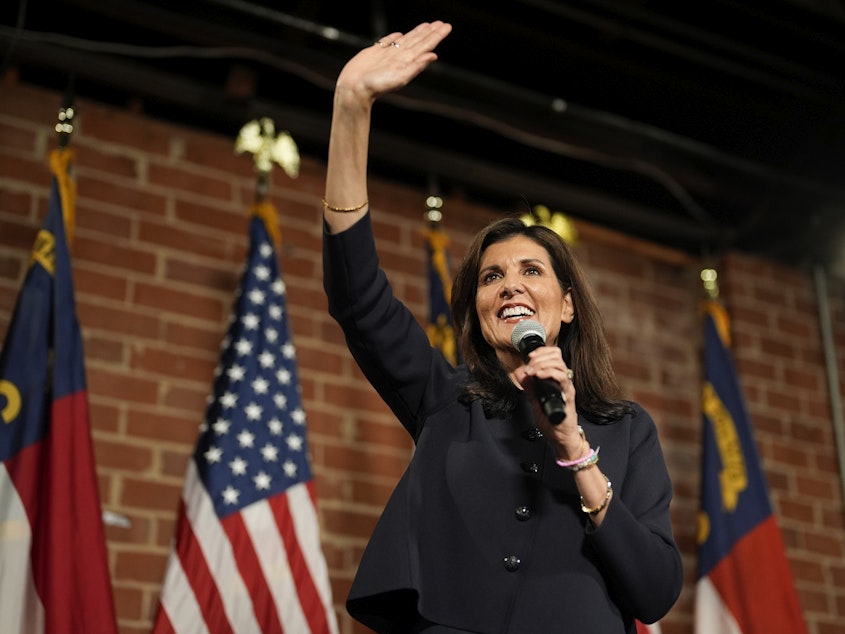Nikki Haley to suspend presidential campaign

Nikki Haley, the last major candidate to challenge former President Donald Trump for the 2024 Republican nomination, will suspend her presidential campaign Wednesday, according to sources familiar with her plans.
The campaign sent an email early Wednesday morning, inviting press to attend prepared remarks at 10 a.m. ET in Charleston, S.C. Her expected suspension comes early after a lackluster showing on Super Tuesday, when more than a dozen states and territories held presidential preference primary contests. Haley won just one, in Vermont.
A former South Carolina governor and Trump's ambassador to the United Nations, Haley pledged to stay in the race even after losing to Trump in the first few states' nominating contests, including her home state of South Carolina on Feb. 24.
Speaking to supporters in Charleston after that election, Haley said she was pressing on through Super Tuesday, and painted an increasingly dire picture of the state of the country and the high stakes for the presidential race.
"I couldn't be more worried about America," Haley said. "It seems like our country is falling apart. But here's the thing — America will come apart if we make the wrong choices."
In South Carolina, Haley argued that roughly 40% of primary voters had signaled their desire for an alternative to Trump by voting for her.
She'd been able to get Trump in a head-to-head race just before the New Hampshire primary, when Florida Gov. Ron DeSantis dropped his bid for the nomination. But she still failed to meaningfully close the gap between herself and the former president in primary and nationwide polls.
Throughout her campaign, which launched in February 2023, also in Charleston, S.C., Haley framed her unique status as a woman of color in the Republican field as evidence for the viability of the American dream.
"I don't believe in glass ceilings," she told supporters at her campaign launch in Charleston. "I believe in creating a country where anybody can do anything and create their own American dream."
Haley's political resume
When Haley joined the race last February, she came into it with extensive political experience. First elected to the South Carolina House of Representatives in 2004, beating a 30-year incumbent Republican, she then went on to serve as the state's first nonwhite and woman governor.
Haley gained national recognition for her response to a racist 2015 shooting at the Emanuel African Methodist Episcopal Church in Charleston that killed nine Black churchgoers. In response to that shooting, she led the effort to remove the Confederate flag from the state capitol grounds. Then, in 2017, Trump appointed her to represent the U.S. at the United Nations, where she became known for her hawkish foreign policy.
That resume could not overcome, however, a Republican Party that moved more in the direction of Trump after she served as governor.
Finding a balance
Haley sometimes appeared to struggle with her messaging as she straddled the difficult line between pleasing the Republican base and appealing to independents, moderate Republicans and other voters who are disaffected with Trump. In one of her most notable gaffes, Haley failed to identify slavery as the cause of the Civil War when questioned during a campaign stop in New Hampshire, a comment she quickly walked back.
She also stumbled in her response to a controversial Alabama Supreme Court ruling that threatened access to the fertility procedure in vitro fertilization, or IVF — a procedure that has overwhelming public support, including among many voters who oppose abortion rights.
Asked for her thoughts in an interview with NBC's Ali Vitali, Haley said, "Embryos, to me, are babies," before clarifying her support for access to the procedure in subsequent interviews. Haley later told Newsmax, "you don't want to take those fertility treatments away from women."
Haley spent the last several weeks of her campaign stepping up her attacks on both Trump and President Biden, emphasizing both candidates' relatively advanced age. She also went after Vice President Kamala Harris, warning South Carolina voters that the United States would soon have a female president: either Haley or Harris — another jab at Biden's age and perceived frailty that also drew a contrast between her and Trump.
An uphill fight against Trump
But her anti-Trump messaging and increased attacks on his age failed to chip away at his resounding popularity among Republicans and loyalty within his MAGA base.
Even though Haley was a popular governor while she led South Carolina, the former president's standing in the state proved to trump hers in the state, which has a high percentage of voters who consider themselves "very conservative," a large white and evangelical Christian population, and, notably, not many independents — a voting bloc that leaned toward Haley in the New Hampshire primary.
Trump also fought aggressively against Haley in the final days of the race, ramping up his attacks and ads against her.
Notably, in remarks on Tuesday evening as results continued to roll in from the primary contests, Trump spoke but did not mention Haley.
With Haley's departure from the race, a general-election rematch between Trump and Biden appears all but official. Neither candidate can secure enough delegates to be the presumptive nominee until mid- to late-March. [Copyright 2024 NPR]
